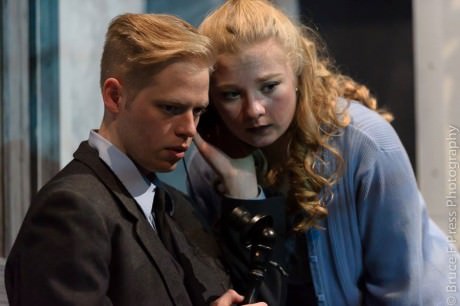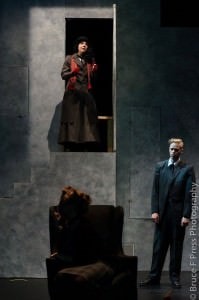If George and Mary Bailey, the main couple in It’s a Wonderful Life, time traveled from the 1940s to the 2010s, they might have trouble identifying with the young actors cast in three of the pivotal roles in the play (produced by Arts Collective @HCC [AC].

If they spoke to Noah Bird who plays George, they would find a young man who looks forward to working in the theater. Noah has worked in media animation (not even a possible dream in those days) and still not settled in his life’s path. It will probably be in the arts. George’s path was more clearly drawn by the time it came for him to settle down. Noah was probably younger than George when George’s father died and took over running the family Building and Loan Company. George was married younger than most compared to the generations that were born in the last 40 years. Noah is not even contemplating settling down with a partner at this time in his life.

Rachel Bailey (not to be confused with Mary Bailey nee Hatch who she plays) has already gotten her Associates degree from Howard Community College but looks forward to transferring to Towson University in the spring where she will major in Theater and Deaf Communications.
Mary was a stay at home mom – something Rachel is not contemplating at this point. She is not ready to give up her ambitions for, as we say today, a significant other. George and Mary would be surprised that Rachel saw, “That women’s rights and opportunities have opened up and there are so many things they can do.” The Baileys of the play would be bewildered by George’s statement, “Male and female roles have blurred.”

Emma McDonnell, who performs the role of Clara, has taken on the role that was mostly played by a male (the character’s name in the script is Clarence). Emma is working for Howard Community College’s Arts Collective and other theatrical groups as a freelance illustrator. She is very organized and handled her job well as liaison with DC Metro Arts for this three-part series. She also thought it was kind of odd that we even talked about the need for significant others. She saw her self-worth as being successful in her own career and not her marital status.
All three saw their soul mates as a family member or friend. Noah stated his longtime friend was like a brother, and they could sit an hour and a half in a car and say nothing. Emma said there were people in her life “whose very presence could lighten your heart.”
Of course, George and Mary might just think this acting group is just “show business” folks. Jimmy Stewart (George in the movie) did not marry until his 40’s, and Donna Reed, who made of career of playing all-American moms, had 3 husbands by the time she was 40. (Note: Stewart was connected with several actresses before he was ready to tie the knot.) However, Stewart, like Harry Bailey, faced World War II and, unlike his brother George, served and became a hero even though he was originally 4-F. Donna Reed’s first marriage was in her early 20’s, and she started her career before she turned 20. By the time Stewart went into the Air Force in his 30’s, he already had won an Academy Award (The Philadelphia Story). Both actors were products of the depression as well. The newer generations seem to wait longer to settle into a career, marriage and family. 30 is the new 20 in those areas at least.
Some ideals transcend time. All three actors talked about George’s selflessness. If George had a flaw, it was sometimes neglecting himself. Trying to think of a contemporary counterpart to George, Noah talked about working with someone on another production that was the type of person that was always positive and always on an even keel. Rachel thought also that Mary’s only flaw may have been her selflessness as well. With such a large family and George’s business and work ethic, she never thought of herself. They all felt sometime you have to put yourself first to protect your own physical and mental health. You cannot take care of others if you are not taking care of yourself. Rachel thought her mother was like Mary. Her mother was always giving. Until Rachel was 8 her family fostered troubled teens, and she had vivid memories of helping mom work to serve meals to the needy at their church.
Emma was the only one not to have seen the movie in its entirety. That was probably a good thing since her role is usually played by a male (Clarence) and in the movie the actor was already in his 7os. Emma is still in the early part of her adulthood. The directors cast her because of her energy and spark. Emma knew, however, this was not a feminine role. She did see the angel as fun and light hearted, even a little immature. Clara is a soul who has been around in heaven a long time and still has not been able to get her wings. They show that the angel has been unsuccessful getting her wings for so long through the costuming rather than by aging Clara to match her movie counterpart. She cleverly watched old movies to “study the physicality and timing of actors from that era to try to remain faithful to the aesthetic we are trying to create.” That helped with understanding how to give the play the feel of the era it was written. Emma, it is interesting to note, thinks there are guardian angels on earth that help you out when you need it, but isn’t convinced that the celestial variety with wings exists.

Rachel admitted playing a woman who puts her ambition aside for her husband’s desire to help his community was hard. She did give Mary a little more ambition than other actors might. They all felt that the play, primarily because of the role of Mary, was sexist and unfair. First of all, in those decades women often gave up their careers for their husbands. Most women had “glass ceilings.” Second, when discussing the scene of what Mary’s life would be without George, they felt it was much stronger dramatically if Mary’s life was crippled without George. Noah pointed out it was not just Mary who was negatively affected with a life without her husband, but almost everyone in the town. The three actors all felt that Mary and George completed each other. Noah pointed to the scene where it is Mary who suggests giving up their honeymoon money to save others. These two were a perfect whole.
In addition to studying movies from the era, Emma used information she learned in her classes. Noah said he started listening solely to the music of the time as it “reflects the times.” He thought it was very upbeat and wondered if this was to give false optimism to people then. Rachel used her grandmother as a source for her role. Her grandmother was 7 at end the Depression. Rachel told us a poignant story how her grandmother was able to get real meat, not the horsemeat sometimes sold at the markets, for the family through a connection with the cook at the Howard Johnson’s Restaurant and how people got lard with a yellow food coloring capsules instead of butter.
Since the play deals with the utter despair that George confronts when it seems all is lost, Noah was asked to give some insight into how he dealt with this. He admitted that like many of us he had times he felt depressed at times. However, he never felt the utter despair depicted in the show “with so many things crashing down at once.” He used his bad times to help portray this time for George Bailey. All three saw Mary and George as the iconic couple who love and support each other. George is selfless and Mary, as Noah stated, “Is on the same page.”
All agreed that George is seen as everyman, and agreed the average person can affect change. This is what Capra, the movie’s creative director tried to show in many of his films. Noah pointed out that in the script George Bailey is called “Everyman of Bedford Falls” in the character description. They felt that today’s world is different, and we can change things through the Internet and other technologies. However, Emma said she was not sure today’s youth were as knowledgeable about the world even with all the technology. The other two agreed that there was something to be said about the lack of basic education, especially government issues, young people had today.
The three never gave much thought to what the world would be if they did not exist except for Emma who said only in “those dark times.” However, Rachel told about a close family friend who died recently. This friend was a huge influence her life and Rachel had given thought to what her own life would have been if the friend had not existed. Also Rachel and her family were able to show this woman “pure love” perhaps for the first time which had made a difference in her friend’s life. Noah said he did give this some thought only after starting the show. He thinks about people he has been there for when they needed help. “It’s a really weird thought,” he went on, “and super surreal.”
Rachel believed, Mary’s most revealing scene is the one early on when she and George finally become a couple. We see how long she has loved George and how she waited for him to notice her. She is very vulnerable and even at times silly. Her favorite line Mary delivers is from that scene, “Too young, or too old.”

Noah felt the scene that we got the most insight into what makes George tick is the scene when there is a run on the bank and George is trying to be a good family member by placating his uncle. George is also attempting to rally the people of the town and giving out his own money to save the bank and the town’s financial stability. It shows how much George is altruistic, and then, later with his wife, how much he loves Mary in a “sweet gooey moment.” He even displays his sense of humor as the scene ends. The line Noah will always remember is the one that has some grammatical twists and was difficult for him to remember. That often happens in developing a play. Those problems stick in your mind.
Emma felt the most important scene for Clara was when “time catches up to itself” at the end of Act II in Bedford Falls without George. Although she was always a sympathetic character, she “wears her heart on her sleeve,” and we see an angel who is not just bright and humorous but a really caring being. She had no favorite line for her character but felt the audience would find one if the line was already famous or the because of the actor’s delivery.
The final impression might be best scene through the eyes of the actors who first did these roles in 1946 for Capra. Despite their ages, this cast would be seen as experienced thespians. Noah Bird has been involved in the Chesapeake Shakespeare Company in Our Town and Romeo and Juliet. Rachel Bailey has appeared in AC’s production of Ragtime: The Musical and A Christmas Carol. Emma McDonnell has been a regular member of AC’s improvisation group (W.I.G.) and has performed in their productions of Dracula among others there. Possibly, Henry Travers who played Clarence would have enjoyed seeing the role he made famous done by a much younger, vivacious female. All the three movie counterparts were performers almost all their lives, working until they were no longer able. They would have been enthusiastic about these young performers and would be supportive in their pursuit of careers in the arts.
Arts Collective’s production of It’s A Wonderful Life plays though this weekend at Howard Community College performing at the Horowitz Center’s Smith Theatre – 10901 Little Patuxent Parkway, in Columbia, MD. For tickets call (443) 518-1500, or purchase them online.
Running Time: Approximately 2 hours, including one 15-minute intermission.
Recommended for audiences 12 years of age and up.
Here are directions to the Smith Theatre and parking information.
LINKS
Arts Collective at Howard Community College Presents ‘It’s a Wonderful Life’ December 4 – 14th by Susan G. Kramer.
Arts Collective @ HCC’s ‘It’s a Wonderful Life’ Interviews Part 1: ‘Paths Intersect Again After 20 Years’: Co-Directors Gareth Kelly and Anthony Scimonelli by Susan Brall.
Arts Collective @ HCC’s ‘It’s a Wonderful Life’ Interviews Part 2: A Peek at the Multi-Generational Cast of ‘It’s a Wonderful Life’ by Susan Brall.
Arts Collective @ HCC’s ‘It’s a Wonderful Life’ Interviews Part 3: ‘Leaps in Time With Noah Bird, Rachel Bailey, and Emma McDonnell.’





